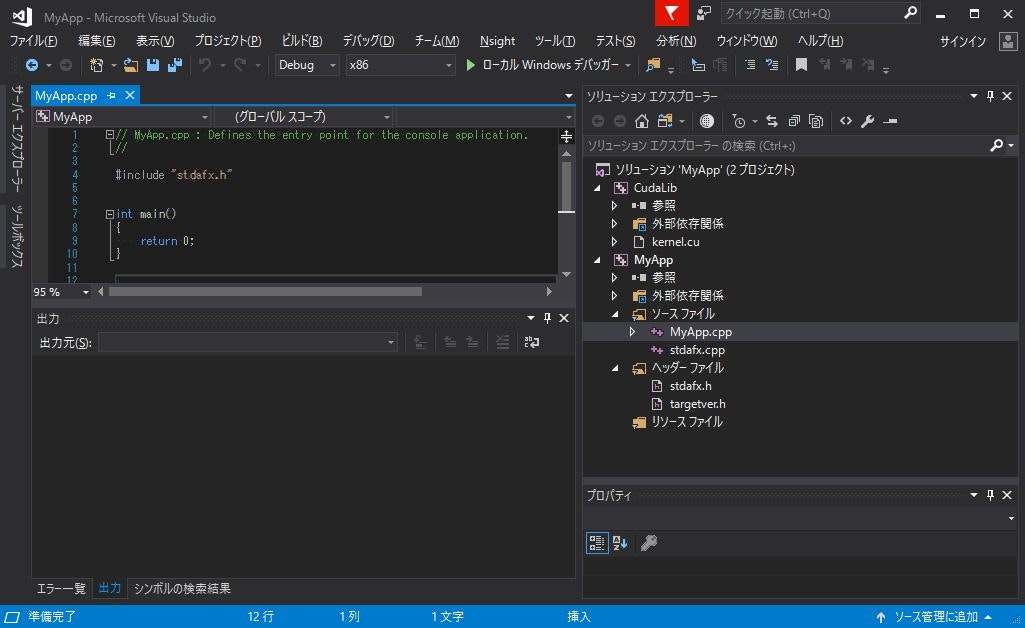こちらでCUDAのインストール方法を紹介しましたが、これではCUDA専用のプロジェクトとなってしまいます。この記事では、実装したCUDA関数をDLLライブラリとしてエクスポートして、他の通常のプロジェクトから呼び出せるようにします。
もっといい方法があればぜひ教えてください。DLLなので呼び出しコストが気になります。
環境
- Windows 10
- Visual Studio Community 2017
- CUDA Toolkit 9.0
目的
- 通常のアプリケーション(この記事ではWindows Console Applicationを使用)から、CUDAで実装した処理を呼び出せるようにする
- CUDAライブラリ側の独立性を高めて、チューニングやユニットテストをやりやすくする
- 通常のアプリケーション側ではCUDAに関する設定は一切不要にする
ソリューションとプロジェクトの用意
1つのソリューションの中に、2つのプロジェクトを作成する。一つは通常のアプリケーション、もう一つはCUDAライブラリ用のプロジェクト。
- ファイル -> 新規作成 -> プロジェクト -> Visual C++ -> Windows デスクトップ -> Windows コンソール アプリケーション
- ここでは、MyAppという名前にする
- MyAppソリューションと、MyAppソリューションの下にMyAppプロジェクトが生成される
- ソリューションエクスプローラ上でMyAppソリューションで右クリック -> 追加 -> 新しいプロジェクト -> NVIDIA -> CUDA 9.0 -> CUDA 9.0 Runtime
- ここでは、CudaLibという名前にする
- MyAppソリューションの下に、CudaLibプロジェクトが生成される
- 最終的には下記のような構成になります。
ソリューションの構成設定 (重要)
基本的に使用するのは、Debug/Releaseのx64。ビルド設定や、プロジェクトのプロパティを変更する際には、x64向け設定になっていることを確認する。
複数プロジェクトをまたぐので、スタートアッププロジェクトの設定を変更すると便利かも。
MyAppソリューションで右クリック -> プロパティ -> スタートアッププロジェクト -> 現在の選択
CudaLib
計算用関数とWrapperの実装
- CudaLib上で右クリック -> 新しい項目の追加 -> Visual C++ -> C++ファイル
- main.cpp
- CudaLib上で右クリック -> 新しい項目の追加 -> Visual C++ -> ヘッダーファイル
- CudaLib.h
- デフォルトで作られたkernel.cuはファイルは再利用するが中身は全てデリート
下記の実装で、まずはライブラリ関数単体として動作することを確認する。
CudaLib.h
# pragma once
namespace CudaLib
{
# if 0
} // indent guard
# endif
# ifdef DLL_EXPORT
__declspec(dllexport) void complexCalcOriginal(int *in, int *out, int n);
__declspec(dllexport) void complexCalcFast(int *hIn, int *hOut, int n);
# else
__declspec(dllimport) void complexCalcOriginal(int *in, int*out, int n);
__declspec(dllimport) void complexCalcFast(int *in, int*out, int n);
# endif
}
main.cpp
/*
* Note:
* To switch output type (dll/exe), Project Configuration Properties -> Configuration Type
* *.exe for unit test
* *.dll for dll library
*/
# include "stdio.h"
# include "stdlib.h"
# include "CudaLib.h"
using namespace CudaLib;
bool unitTest(int n)
{
int *in = new int[n];
int *out1 = new int[n];
int *out2 = new int[n];
for (int i = 0; i < n; i++) in[i] = rand() % 100;
complexCalcOriginal(in, out1, n);
complexCalcFast(in, out2, n);
int i;
for (i = 0; i < n; i++) {
if (out1[i] != out2[i]) {
printf("error at index = %d\n", i);
break;
}
}
delete[] in;
delete[] out1;
delete[] out2;
if (i == n) return true;
return false;
}
int main()
{
if (unitTest(10)) {
printf("OK\n");
} else {
printf("ERROR\n");
}
return 0;
}
kernel.cu
# include "cuda_runtime.h"
# include "device_launch_parameters.h"
# include <stdio.h>
# include "CudaLib.h"
namespace CudaLib
{
# if 0
} // indent guard
# endif
void complexCalcOriginal(int *in, int *out, int n)
{
for (int i = 0; i < n; i++) {
out[i] = in[i] * 2;
}
}
__global__ void complexCalcFastLoop(int *in, int *out, int n)
{
int i = threadIdx.x;
if (i < n) {
out[i] = in[i] * 2;
}
}
void complexCalcFast(int *hIn, int *hOut, int n)
{
int *dIn;
int *dOut;
cudaMallocHost((void**)&dIn, n * sizeof(int));
cudaMallocHost((void**)&dOut, n * sizeof(int));
cudaMemcpy(dIn, hIn, n * sizeof(int), cudaMemcpyHostToDevice);
complexCalcFastLoop <<<1, n>>> (dIn, dOut, n);
cudaDeviceSynchronize();
cudaMemcpy(hOut, dOut, n * sizeof(int), cudaMemcpyDeviceToHost);
cudaFree(dIn);
cudaFree(dOut);
}
}
MyApp
インクルードパスとライブラリの参照設定
- MyAppで右クリック -> C/C++ -> 全般 -> 追加のインクルードパス
- ../CudaLib
- MyAppで右クリック -> リンカー -> 入力 -> 追加の依存ファイル
- ../x64/Debug/CudaLib.lib
- ../x64/Release/CudaLib.lib
MyAppからCUDAで実装したライブラリ関数を呼ぶ
通常の関数として呼べる。
MyApp.cpp
# include "stdafx.h"
# include "CudaLib.h"
int main()
{
int n = 5;
int *in = new int[n];
int *out = new int[n];
for (int i = 0; i < n; i++) in[i] = i;
CudaLib::complexCalcFast(in, out, n);
for (int i = 0; i < n; i++) {
printf("%d -> %d\n", in[i], out[i]);
}
delete[] in;
delete[] out;
return 0;
}
普段の運用例
アルゴリズムを改良したい
- CudaLibプロジェクトをEXE形式にする
- CudaLibプロジェクトで右クリック -> 全般 -> 構成の種類
- ダイナミックライブラリ(.dll)をアプリケーション(.exe)に戻す
- CudaLibプロジェクトで右クリック -> 全般 -> 構成の種類
- 新規アルゴリズムを実装する
- 別プロジェクトになっているので、Nsightによるアナライズやユニットテストがやりやすい!!
- 満足する実装が出来たら、再度プロジェクトをDLLライブラリ形式にする
- CudaLibプロジェクトで右クリック -> 全般 -> 構成の種類
- アプリケーション(.exe)をダイナミックライブラリ(.dll)にする
- CudaLibプロジェクトで右クリック -> 全般 -> 構成の種類
実際のプロジェクトファイル

